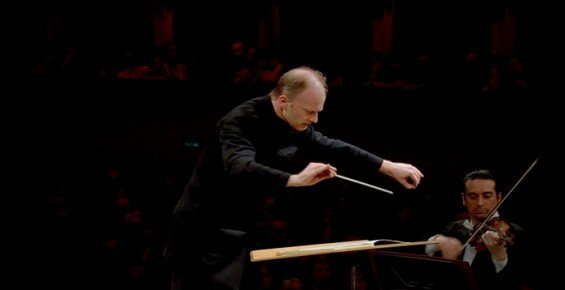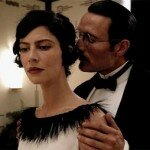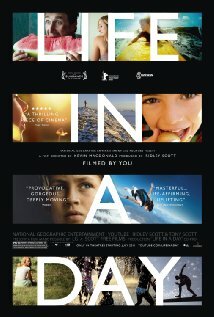Englishman Phil Grabsky loves filmmaking and music. So filming In Search of Beethoven, his second composer-based documentary (following 2006’s In Search of Mozart) was a no-brainer. Exploring the life of the musician and his influences, it’s a biography that shows Beethoven’s everlasting music and the appreciation it receives to this day. Twenty-nine days into a 40-day worldwide trip, we talked to the creator before its current release on the differences between the two, the frustrations of documentary filmmaking – and Judge Judy.
CPR: You’ve toured all over the country haven’t you?
Phil: It’s actually been a 40-day trip (worldwide), the longest I’ve ever been away from my family. Briefly in the States, Canada, New Zealand and then here in Australia – I have Perth, then to Hong Kong and home. There’s a real parallel between Mozart and Beethoven in that they were totally commercial animals. And if you’re making a film these days half of them are very commercial about it. It means you have to see how the film’s distributed and understand what percentage of the box office you get. Because broadcasters don’t fund things anymore – they don’t seem to make these types of films, which are costly. We didn’t think they would be but there’s a lot of craft in them, more than we expected.
In Australia we have issues with local content being unpopular. How do local audiences receive your films differently to international audiences?
Phil: Mozart showed in Australian and New Zealand cinemas for six months. In the UK, I’m lucky if I can get a two or three-day booking and if you don’t get the airtime, no-one sees it. That’s the most frustrating thing for me, people saying ‘Oh I’d love to have seen it but I didn’t know it was on’. I’m not worried about failure, I don’t care about bad reviews but what irritates me is when you don’t get the chance to show the film. I at least want the people to have the opportunity to see it. If you don’t like it, fine. Digital is very exciting though (in the new cinema age)… with Mozart, that came out six years ago and documentaries weren’t in the cinema at all. Michael Moore changed that. With Mozart we had the first digitally distributed documentary and that was going off DVD. Now, in a short period of time it’s hard drives. It looks stunning; it gets in lots of cinemas. We did well with Mozart… the Met(ropolitan) Opera’s done so well in theatres. They can show anything on the big screen now; the Olympics, political rallys. The idea of cinema becoming that real centre of realty is very exciting.
What made you want to look into Beethoven’s life? You’ve done Mozart already, so is this a sequel of sorts?
Phil: (mutters) Is it a sequel? What is a sequel? What does a sequel mean?
I guess everyone could define it differently but simply, it’s usually a follow-on from something else…
Phil: I guess it’s a sequel in that it follows on from Mozart… When I made Mozart, I went out and talked to as many professionals, players, conductors, academics as possible, and it was hard persuading them to let you film them talking and playing, but we managed, and along the way I said to them ‘I couldn’t raise the funds but I’m hoping I can sell it once it’s finished, and it would help me if Mozart was the greatest conductor of all time – is he?’ And they’d say he was one of the greatest composers of all time, one of the most significant creative beings that ever lived. But there’s Beethoven. I couldn’t help myself – you know, these films could’ve only been made recently because of technology. From sat(ellite)-nav(igation) taking me to the musician’s door to iPods with the music these people have written, in chronological order. I listen to it in chronological order because it’s useful. We film and have distribution on digital. Without email, this would’ve been impossible. Seeking permission, seeking rights… the idea of doing all this again was a little bit daunting but I just had to find out who Beethoven was. So whilst on tour with Mozart, my first interview was July ’06 at a music festival in Norway where they were showing the film there were two pianists there and I interviewed them. And we had our London premiere in March ’09. And there’s a year or two of distribution, so it really is a three, four-year project to make a film like this.
What did you see in Beethoven’s character? It goes into how he’s so vulnerable and also strong and ambitious. Slightly contradictory, but what did you find?
Phil: I think that whether you’re seven or 70 you have to be interested in Beethoven. He’s all around you. In the last 48 hours: I was in a cab and the call sign to let you know there’s a job waiting was the opening chord of the 5th Symphony; somebody’s cell-phone had the 9th; and when I arrived in my hotel room here in Adelaide I turned the TV on, and I swear this is true, I turned it on and Judge Judy was playing. I had no idea, but do you know what the opening music is? It’s Beethoven.
Really?
Phil: Unbelievable. I was like ‘This is a joke’. I mean, Judge Judy? They’ve modernised it and played around with it like they did in A Clockwork Orange… we’re surrounded by a lot of people like Britney Spears who are good at what they are but you stand back and have to acknowledge that there are certain people in history that just were quite extraordinary. With Mozart and Beethoven it wasn’t just one major work; they had so many, and it just completely baffled me. So what did I discover? My concern was a little bit with making the film is that he would turn out to be what most people’s image of him is – which is this old man, grumpy, they know that he’s tense, dynamic and a bit angry. I didn’t set out to show him any other way than I discovered, I set out to show exactly who he was. But I was worried that he would be this grumpy, miserable old man. So it was a great delight when I started reading his correspondence that actually you see somebody who’s full of love, hope, optimism, very funny, actually had great friendships and was commercial which I find very interesting. He complained to his copiers about making mistakes, he was pulling all sorts of scams, trying to sell the same piece to different people. So he’s a rounder, warmer, more interesting character than the one who’s traditionally thought of. And that traditional thought really comes off only one portrait as well, where he looks miserable. My main portrait that I use in the film is the other one, where he’s very young, very handsome and what he’s doing as a 17-18 year old is extraordinary.
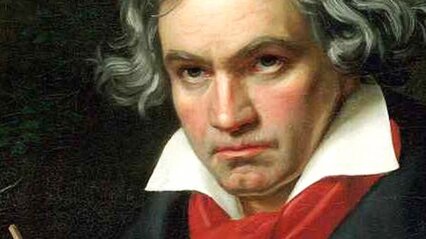
It doesn’t matter what you’re trying to be, a clothes designer or filmmaker, the one thing you need is sheer hard work. I’ve made films about Ali, Pele, and all of them have the attribute of sheer passion, single-minded determination to excel. I was in the States during one interview and I was quoted a line from Martin Luther King: “Even if you’re a street sweeper, be the best street sweeper you can be”. And I think that’s the lesson of Beethoven. He doesn’t want to be wealthy, he doesn’t want to be the best composer of all time – he just wants to take his craft as far as he can take it. Even when he’s dying, at 55 he’s really ill but asking violinists ‘Why do you use that horsehair exactly?’ and ‘How does that wood affect the sound?’…
Why do you think classical music holds so much appeal? To the public and yourself?
Phil: Well I’d have done Michael Jackson if they’d asked me! I’ve been approached to do Elton John. I think the trouble with classical and opera is that I had the sense as a kid that it was for other people. Another class, the elite. Partly it’s the cost of it… partly it’s the way in which it’s traditionally filmed. Still today, people film a live concert from the back of the audience because they can’t be in front of them. They tend to have three angles, maybe four, and it’s very distancing. They’re cutting it live, which isn’t the way to edit music, and it’s dull. I’m not sure I could really watch it on TV… I film it differently with dress rehearsals to get right in there and be next to the conductor, literally two feet from me, or I’m resting the camera on the edge of the keyboard. It’s much more engaging, and you get an idea of how extraordinary this music really is. There’s no chance that if you took any child on the planet to see the flutists playing Mozart they wouldn’t be absolutely enthralled. But if parents don’t take them or television doesn’t have it as what is ‘normal’ … I’m constantly fighting for cultural programs on British TV, where we have quite a good tradition, but their location, food, reality shows are all considered to be part of the tapestry and then you come to them with a film about Mozart and they say ‘Oh no, maybe some day…’ and that’s a real, real problem actually. They don’t understand what classical music is. It should generally be part of our culture. I see a connection between those kids who are never exposed to art and culture and music and those who are beaten up on the streets. I think there’s a connection there. You go to some European countries where it’s much more common to be engaged with music and play and instrument, like Holland, and I would suspect there’s much less youth-related violence there.
Beethoven was a bit of an entrepreneur wasn’t he?
Phil: Absolutely. Mozart basically never wrote anything except for money, for commission. With Beethoven it was slightly different. He benefited from Mozart; there are some pieces he just sets off, but with some when he’s finishing it, he’s writing letters to all the courts of Europe saying ‘You’ve got to buy this, 50 Florins, it’s cheaper, half the price’. The 9th Symphony he writes because he got a commission from London to write it. It’s so easy with these people, to see the entirety of their lives and imagine their natural progressions. Someone could come up to me and say ‘Could you make a film on the Chinese in Zambia’ and I’d say ‘Sure’ and get my camera.
But youalways have a choice don’t you?
Phil: You do, but sometimes you’re swayed by who’s offering more money. For example, I’m very keen to do Haydn (another composer) right now; I’ve started without any money and filmed two concerts. Because he makes up the trilogy and it’s like George Lucas and Star Wars you know – he’s the start. The tipping point for me was an audience member saying ‘Don’t do Haydn, he’s boring’ and I thought ‘I’ll show you’. But I had an enquiry from the Ministry of Culture in Poland from someone who’s seen Beethoven, and they said they’ve got a Chopin exhibition and they’d like me to do something on Chopin. If they came to me with a budget for the film and Haydn’s sitting there with no money at all and no real interest for anybody then my interest will temporarily change.
I was going to ask you about Haydn and whether you would make it three from three… you mention him a lot with Mozart and Beethoven in the film!
Phil: You’re the first person to spot that!
Really?!
Phil: Yep. Everyone else has said ‘Who’s next – Wagner, Franz, Krieg…’
Really? But it’s right there in front of you!
Phil: There you go. See, it’s natural. After Mozart in 2006 everyone was asking who I would do next. I hadn’t decided and I wasn’t sure if I wanted to do anyone. It’s funny because Beethoven thought nothing of doing another symphony, so why was I so hesitant about doing another similar film? Now: if I made 10 of these films it’d be fine by me. One thing I did know is that the editing was 10 months. 10 intensive months where you’re trying to wade through all this extensive information… Someone has to present themselves to you as someone you can feel passionate about and who’s going to get you through all that. And that was Haydn. He just kept coming back. What appeals to me is that I don’t know very much about him and most people don’t know very much about him, but when you talk to musicians they say his string quarters are sometimes better than anyone’s. There’s a lot of humour in his life. I also just love that period and filming in Vienna and Austria again. And from a pragmatic point of view some of these musicians and orchestras have said yes to Mozart and Beethoven would and have already said yes for Haydn. When you have little money that makes a big difference, and then of course it makes a nice DVD triple boxset. The sales will be there… you know, without DVDs we’d be out of business. Half of our income has to come from DVDs. People say to me DVDs will die in two years but that’s a terrible thought for me.
It’s a scary thought.
Phil: I mean Blu-Ray… some of these things are such a scam really… You’ve got to be careful with technology; that it doesn’t come first (before the film itself).
Can I say, watching Beethoven on a DVD, it looked really good. But I was kind of embarrassed because I never realised certain pieces you hear everywhere are his works.
Phil: It’s not a sign of intelligence; it’s just a sign of education and whether you’ve been exposed to it. I can’t remember now but I’m not sure I would’ve known either. That’s what a film can do. Even some of the historical experts, when I’ve gone up to them have said ‘Oh, I didn’t realise that’. And that’s how it is for most of us, it’s nothing to be embarrassed about.
CPR: Do you play the piano? Phil: No. But my two small children started post-Mozart. I tried learning a piece of his but it was just so hard! I don’t have time, but if I was going to play an instrument it would actually be the cello. My brain can do the stroke but two hands doing two different things? I don’t know how you do it.
Now that you’ve researched Beethoven, do you have a favourite piece or consider one to reflect him best?
Phil: One of the great things about Beethoven is the variety so it’s a bit tricky to choose a piece. If I were to take a box set of something to a desert island, assuming I couldn’t take the whole works, I’d take the piano concertas. They’re just unbelievable. I drive to France quite a lot from England and I put those on and they just get me every single time. I thought when I started Beethoven he’d be easier because he wrote less pieces but all his five concertas are just so amazing. I’d say the piano concertas.
Beethoven might be fresher in your mind but could you pick one over the other?
Phil: No. I just think they should both be celebrated. I still listen to Mozart.
You’re a documentary filmmaker – any chance of going into the ‘mainstream’; perhaps doing a Richard Curtis-style romantic comedy?
Phil: No. I’m trying to bring Beethoven into the mainstream. I’m trying to break down the barrier of mainstream and documentary. They’re films, you know. Michael Moore’s done it a bit… but why work with actors when you can work with real people, who are much more interesting? I couldn’t write some of the things I’ve filmed, and if I did no-one would believe them. Nothing is exciting in real life, the drama’s just trying to replicate your life. They spend tens of millions of dollars on these films and it does frustrate me, whereas a documentary filmmaker, you’re struggling to create really good stories. People really don’t know what they’re missing. There’s a definite disjunct between what’s acceptable for drama and what’s not. How many BBC dramas are they going to re-do? I mean, how many Pride and Prejudices do we need? And they spend a fortune. That really gets me down.
What made you consider Juliet Stevenson for the narration; she did Mozart too…
Phil: I was trying to make Mozart without a narrator because it’s one less person between you and the story. But there was too much information and the mix of interviews and scenes with actors left gaps. Couldn’t do a caption because there was too much to read, so quite late in the edit I realised I needed a narrator and someone suggested it’d be good to have a woman because it’s all these men talking in the film. I can’t remember exactly how it came about but it was fortunate she said yes … If I do Haydn, it has to be her. It’s nice to have a female voice and it’s a lovely moment in the production process where mine goes and this proper voice arrives and brings the script to life.
Is there anything else you’d like to add, about the process or the promo tour?
Phil: I wouldn’t recommend anybody else do it! I mean it’s very hard work! It’s not for the faint-hearted. I have to have a team, and any money we make goes back into keeping that team. It’s a huge endeavour… but it’s creatively and fantastically challenging, which is nice.
Thankyou very much!
Phil: Thankyou.
 Follow the author Katina Vangopoulos on Twitter.
Follow the author Katina Vangopoulos on Twitter.
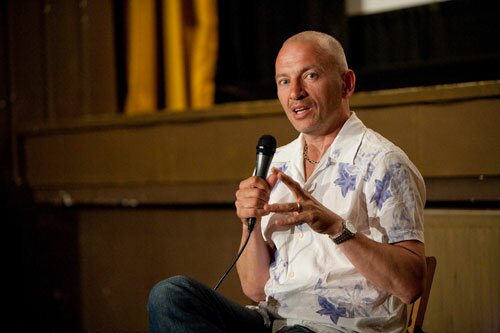
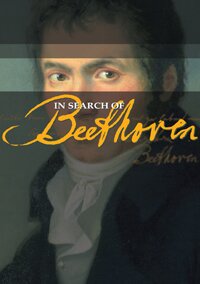
![7b[1] 7b1 510x269 custom Interview: Phil Grabsky, creator of In Search of Beethoven](/wp-content/uploads/7b1-510x269-custom.jpg)
